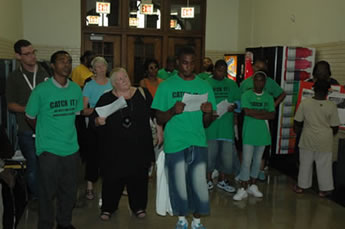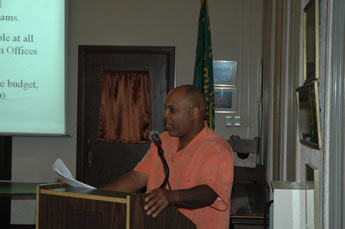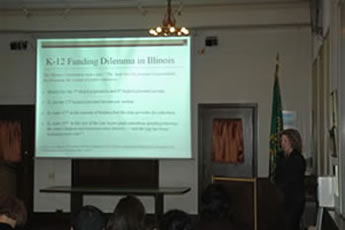The Chicago Board of Education’s new budget director, Beth Swanson (above, right) presented the Board’s Power Point presentation on the budget August 14 and August 15 (during a thunderous rainstorm at Juarez High School). Because no one asked to speak on August 16, CPS officials ended the hearings at Morgan Park High School without the presentation. Swanson continued to present the CPS case about Illinois school funding although critics have begun to point out that CPS has been receiving higher and higher dollar amounts from Illinois since the Democrats resumed control of state government three years ago.
CPS budget hearings August 14 - August 16, 2007…
School unions offered three percent raises, while revenues increase by more than five percent per year!
Although the Chicago Board of Education released its proposed 2007-2008 budget two months late, there was little improvement in the way the budget presented information on how Chicago will spend nearly $6 billion on public education in the coming year, and as the annual budget hearings progressed, it became clear that  Members of the Austin community “Freedom Riders” spoke at a press conference on August 14 at Lane Tech High School prior to the first night of the budget hearings. The press conference was only covered by public radio, Catalyst and Substance. The rest of Chicago’s media — including the Chicago Tribune and Chicago Sun-Times — ignored the event completely and made no reports on the nearly $6 million public education budget for the third largest school system in the USA. All photos this page (unless otherwise indicated) for Substance by George Schmidt.the documents presented to the public raised more questions than they answered.
Members of the Austin community “Freedom Riders” spoke at a press conference on August 14 at Lane Tech High School prior to the first night of the budget hearings. The press conference was only covered by public radio, Catalyst and Substance. The rest of Chicago’s media — including the Chicago Tribune and Chicago Sun-Times — ignored the event completely and made no reports on the nearly $6 million public education budget for the third largest school system in the USA. All photos this page (unless otherwise indicated) for Substance by George Schmidt.the documents presented to the public raised more questions than they answered.
The annual budget hearings were held on August 14, 15, and 16. The Board of Education is expected to approve the budget at its August 22 meeting, despite its enormous and controversial flaws.
One week before the Chicago Board of Education admitted that it would be receiving  Austin community leader Dwayne Truss (above) asked how much money CPS was losing in property taxes because of the expansion of TIFs across the city. He never got a straight answer from CPS officials.revenue increases of at least five percent in the coming year in its operating budget, Mayor Richard M. Daley held a press conference at City Hall to announced that all of the unions representing school workers had agreed to five
Austin community leader Dwayne Truss (above) asked how much money CPS was losing in property taxes because of the expansion of TIFs across the city. He never got a straight answer from CPS officials.revenue increases of at least five percent in the coming year in its operating budget, Mayor Richard M. Daley held a press conference at City Hall to announced that all of the unions representing school workers had agreed to five ![Substance editor George Schmidt speaking about what he calls the "most dishonest budget in [board history]".](../assets/schmidt_about_budget.jpg) George Schmidt
George Schmidt
Substance editor George Schmidt called the 2007-2008 budget the most dishonest in the 28 years since he began analyzing CPS budgets. In addition to criticizing the format, which makes the budget inaccessible to most citizens, Schmidt, along with others, noted that the numbers themselves don’t add up. Photo of Schmidt by Wendy Boatman. All other photos this page by George N. Schmidt for Substance.year contracts with the Board containing raises that were three percent per year.
The disparity between the increased dollars available to the nation’s third largest school system and the amount the system is willing to spend on the majority of its workers was underscored during the second week of August. On three evenings, the CPS financial staff briefed the public on its $5.8 billion annual budget (operations and capital). In its own materials, CPS showed that its operating revenues will increase by 5.3 percent in the coming year, with overall revenues (operations and capital) increasing by nearly twice that much.
One of the most important revelations that came out during the hearings is that CPS did not have to draw down its “Reserves” during the 2006-2007 school year, despite widespread media reports between January 2006 and June 2006 that the school system was facing a “deficit” of more than $300 million (as was claimed by Arne Duncan at one point). With the final results of the 2006-2007 school year in, it was clear that CPS did not have to implement the controversial and painful cuts of $26.5 million is special education services at all last year!
Because the documents made available to the public for review are difficult to decipher and enormously complex, budget analysts who have reviewed the materials for decades are preparing to ask the Chicago Board of Education at its August 22 meeting to postpone the budget until dozens of precise questions about the budget and its format can be adequately answered. Problems with the CPS budget have been growing for more than a year. In June 2006, for the first time, CPS presented its proposed budget in both text and CD format. Although CPS officials hailed the CD as an innovation, the innovation, like others involving high technology in recent years, simply added to the obscurity and needless complexity of the Board’s financial reporting systems. Like the controversial People Soft payroll system and the controversial IMPACT records system, the CPS budget has become a barrier to the education of children and democracy in Chicago, rather than an aide to the public in understanding one of the city’s most important activities.



